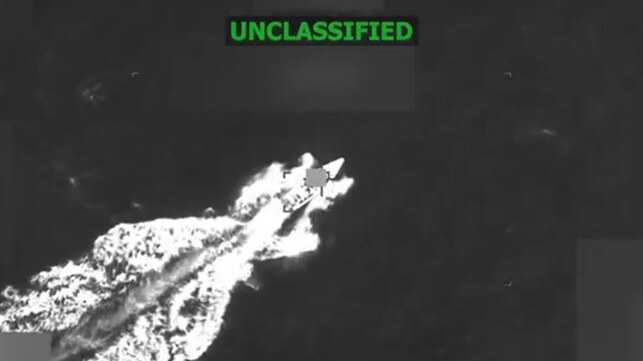US Strikes on Drug Smuggling Boats Prompt Warning for Commercial Ships

The U.S. on Friday, November 7, announced its latest strike on a small boat in the Caribbean believed to be smuggling drugs. It is the 17th reported strike, and as the U.S. continues its offensive, warnings are going out for the possible consequences for commercial shipping, which has already been used by the cartels to often unsuspectingly ferry the narcotics overseas.
The latest strike was announced online by Pete Hegseth, who said, “three male narco-terrorists were killed.” He continues to assert that these boats are “operated by a Designated Terrorist Organization,” while saying the strikes will continue until the groups stop smuggling drugs into the United States.
By the latest count, the U.S. has now destroyed 17 boats and one semi-submersible. The death count stands at 69 or 70 people, with only two or three people surviving the initial attacks.
While Hegseth continues to label the operators of the boats “narco-terrorists,” Associated Press issued a lengthy story piecing together the details on nine of the individuals after interviews in Venezuela. It concludes that the boats are drug runners, but mostly operated by ordinary individuals, and not the leaders of the cartels or gangs. They write that the men were crewing the boats for the first or second time and were laborers, a fisherman, a taxi driver, or low-level career criminals.
Global insurance company Gard, which bills itself as the world's leading provider of marine insurance and energy insurance, advises that cocaine smuggling is on the increase and cites data from the United Nations Office on Drugs and Crime reporting that cocaine flows to Europe have increased dramatically compared to North America. They highlight the need for vigilance and preventive measures in the shipping industry and call for fair treatment of crews when smuggled drugs are found in the cargo or aboard the ships.
“Use of the military against suspected drug smuggling boats by the current U.S. administration may also push more activity toward commercial vessels,” advised Gard. It notes that the high-risk areas for cocaine smuggling include Colombia, Ecuador, Peru, Mexico, Brazil, and Venezuela. “Patterns may change due to increased pressure by law enforcement, both by authorities in countries of production and countries where the drugs are found,” they advise.
As we’ve said before, vessel strikes on narco-terrorists will continue until their the poisoning of the American people stops.
— Secretary of War Pete Hegseth (@SecWar) November 7, 2025
Today, at the direction of President Trump, the Department of War carried out a lethal kinetic strike on a vessel operated by a Designated Terrorist… pic.twitter.com/gQF9LpSjqD
Senior loss prevention specialists at Gard prepared a detailed analysis of the consequences of drug smuggling for the commercial shipping industry. The article warns that “rising cocaine production and evolving trafficking routes are creating serious risks for commercial vessels.”
They report that packages may be placed by rogue employees working for shipping companies or terminals, and that there have been reports of drug traffickers disguised as port officials and stevedores. The European authorities have also warned that ports have been infiltrated by the drug cartels.
“In Gard’s experience, cocaine trafficking using commercial vessels as unwitting ‘drug mules’ is increasing with the associated perils to crew and ship when drugs are found.” They report that most often the drugs are hidden in containers either with the cargo or in the structure, but have also been found in bulk cargoes. It also says that its experience shows there are only a small number of cases where drugs are discovered on board or attached to a vessel.
The U.S.’s high-visibility strikes came as the U.S. Coast Guard also reported it achieved a new record for cocaine seizures. The service maintains interdiction patrols in both the Caribbean and Pacific, which seize the boats and turn over the individuals for prosecution.
Opposition continues to the lethal strikes despite Donald Trump and Pete Hegseth saying they are necessary, legal, and will continue. Experts have noted that it stops only a small amount, and it does nothing to address the demand and addictions among the American public.

that matters most
Get the latest maritime news delivered to your inbox daily.
The U.S. Congress has also questioned the strikes and highlighted that it was not being briefed, and no evidence was presented to support the contention that the efforts were based on intelligence and known drug traffic routes. A Congressional briefing was conducted on November 5. It came after the Senate last month narrowly rejected a resolution calling for Congressional approval for the strikes in the Caribbean. On Thursday, November 6, the Senate also narrowly voted down a measure requiring military approval for any military action against Venezuela.
Hegseth wrote today on social media, “If you want to stay alive, stop trafficking drugs. If you keep trafficking deadly drugs – we will kill you.”
